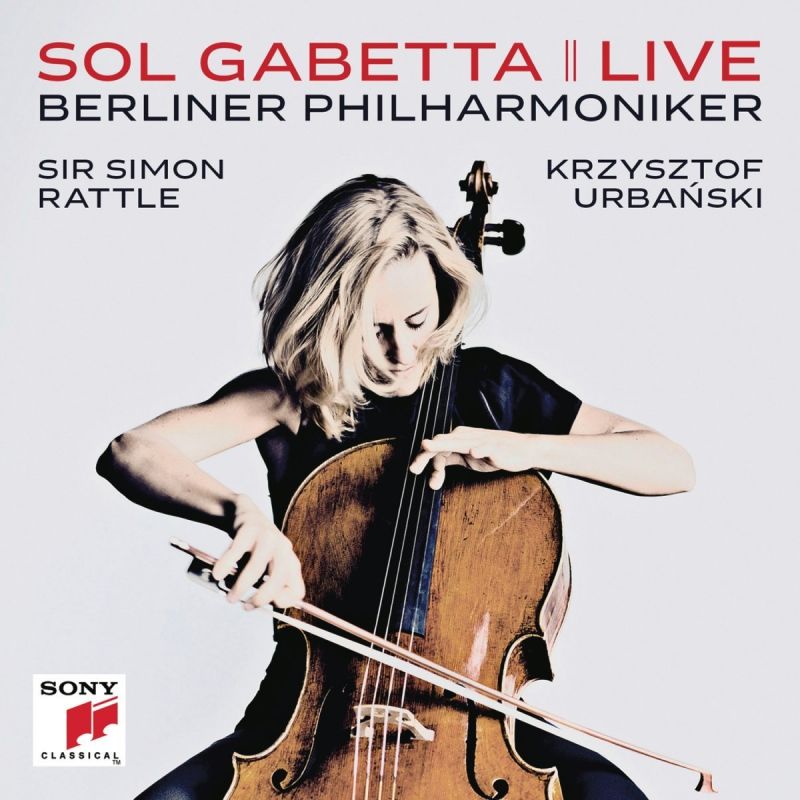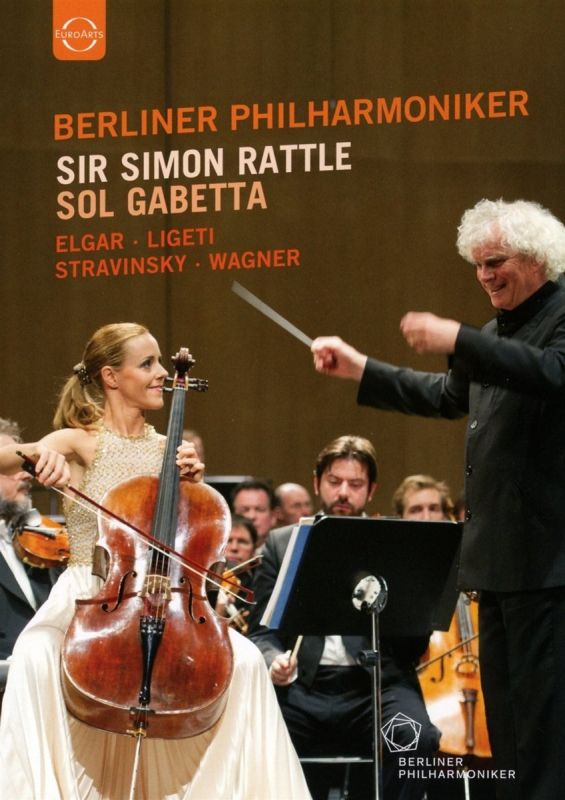Sol Gabetta: Live
View record and artist detailsRecord and Artist Details
Composer or Director: Bohuslav (Jan) Martinu, Edward Elgar
Genre:
Orchestral
Label: Sony Classical
Magazine Review Date: 02/2017
Media Format: CD or Download
Media Runtime: 55
Mastering:
DDD
Catalogue Number: 88985 350792

Tracks:
| Composition | Artist Credit |
|---|---|
| Concerto for Cello and Orchestra |
Edward Elgar, Composer
Berlin Philharmonic Orchestra Edward Elgar, Composer Simon Rattle, Conductor Sol Gabetta, Cello |
| Concerto for Cello and Orchestra No. 1 |
Bohuslav (Jan) Martinu, Composer
Berlin Philharmonic Orchestra Bohuslav (Jan) Martinu, Composer Krzysztof Urbanski, Conductor Sol Gabetta, Cello |
Composer or Director: Igor Stravinsky, György Ligeti, Richard Wagner, Edward Elgar
Genre:
Orchestral
Label: Euroarts
Magazine Review Date: 02/2017
Media Format: Digital Versatile Disc
Media Runtime: 90
Mastering:
DDD
Catalogue Number: 205 9968

Tracks:
| Composition | Artist Credit |
|---|---|
| Atmosphères |
György Ligeti, Composer
Berlin Philharmonic Orchestra György Ligeti, Composer Simon Rattle, Conductor |
| Lohengrin, Movement: Prelude |
Richard Wagner, Composer
Berlin Philharmonic Orchestra Richard Wagner, Composer Simon Rattle, Conductor |
| Concerto for Cello and Orchestra |
Edward Elgar, Composer
Berlin Philharmonic Orchestra Edward Elgar, Composer Simon Rattle, Conductor Sol Gabetta, Cello |
| (The) Rite of Spring, '(Le) sacre du printemps' |
Igor Stravinsky, Composer
Berlin Philharmonic Orchestra Igor Stravinsky, Composer Simon Rattle, Conductor |
Author: Rob Cowan
Rattle’s presence can be heard, and felt, in virtually every bar of the score: the way he moulds phrases, nudges details to the fore, bends the line, holds tight to a salient accompanying detail (especially along the lower end of the spectrum) or responds to Gabetta’s characterful solo playing, now rather more stylised than it was before. She’ll toy with slides, vary her vibrato or suspend it altogether, indulge a widened range of dynamics and, at the start of the finale proper, gallop away with tremendous energy, more so than with Venzago.
Printed alongside that original 2010 review was an interview in which Gabetta confessed how important it is to find a different interpretation to Jacqueline du Pré’s. ‘The most terrifying thing to do as a young artist is to try and copy it because you can’t – and of course I wouldn’t want to’, as she put it then. Revisiting that older version now, I hear the ‘purity and clarity’ she was aiming at, but paradoxically the passing of time seems to have allowed her licence to be freer, more outgoing, more emotive and more expressively generous in her approach. Of course Rattle, the Berlin Phil and the live performing environment are likely contributing factors to this subtle rethink but I suspect that Gabetta’s renewed responses to Elgar are more significant still.
The DVD performance (also set down at the Festpielhaus, Baden-Baden, in 2014), if not absolutely identical, is more or less so. We note Gabetta’s tensed arm, back and shoulder musculature, her facial mobility, bodily too, in the first movement’s swaying second subject. In the scherzo it’s good to see her visibly relating to the other players, her habitually serious expression breaking into a smile, whereas you sense from her expressions that for her the Adagio is more a sighing song of thanksgiving than a mournful threnody.
Prior to the Elgar, Rattle conducts Ligeti’s Atmosphères, which is fascinating to watch on account of its massive scoring, including clothes brushes drawn across the piano strings, and there’s the magical segueing into the first-act Prelude to Wagner’s Lohengrin. It’s obvious that Rattle is having a whale of a time in The Rite of Spring and the orchestra respond to him with loving attention: note the long crescendo and gradual application of vibrato at the start of the opening bassoon solo and the groaning tonal fallout at the start of ‘The Sacrifice’. Taut rhythms and a sense of balletic engagement are also much in evidence.
As to which way you should acquire Gabetta’s fairly unmissable new account of the Elgar, if you’re especially keen on the idea of Rattle’s programme (a very good one) then go for the DVD; otherwise I’d stick with the CD, mainly because, musically speaking, Martinů’s Concerto is such a worthwhile and unusual coupling. The Elgar certainly compares favourably with, among digital options, Natalie Clein, Alisa Weilerstein and Steven Isserlis.
Discover the world's largest classical music catalogue with Presto Music.

Gramophone Digital Club
- Digital Edition
- Digital Archive
- Reviews Database
- Full website access
From £8.75 / month
Subscribe
Gramophone Full Club
- Print Edition
- Digital Edition
- Digital Archive
- Reviews Database
- Full website access
From £11.00 / month
Subscribe
If you are a library, university or other organisation that would be interested in an institutional subscription to Gramophone please click here for further information.




